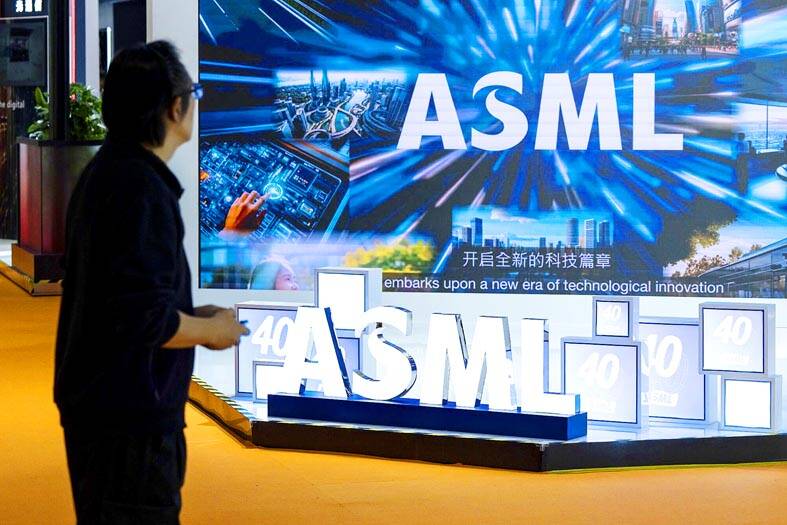ASML Holding NV, a Dutch manufacturer of advanced chipmaking machines that are critical to global supply chains, yesterday reaffirmed its long-term revenue outlook as it bets on an artificial intelligence (AI)-driven boom in semiconductor demand.
The Dutch firm projected that sales in 2030 would range from 44 billion euros to 60 billion euros (US$46 billion to US$63 billion), in line with its previous forecast, according to a statement issued as part of the company’s investor day.
The outlook is meant to reassure investors after the company’s order intake significantly missed analysts’ estimates in the third quarter, sparking a selloff in its shares and those of other chip-related businesses. Chipmakers such as Nvidia Corp have enjoyed a boom in demand for their AI chips. However, sales to other key buyers, including automakers, and mobile phone and PC manufacturers, have remained mired in a prolonged slump.

Photo: Bloomberg
ASML expects growing AI demand would help boost global chip sales to over US$1 trillion by 2030, which it said represents an annual growth rate in the semiconductor market of about 9 percent.
ASML is the only company in the world that makes the kind of lithography machines that help semiconductor companies in turn produce the advanced chips powering everything from Apple Inc’s smartphones to Nvidia’s AI accelerators.
Manufacturing more cutting-edge AI chips would mean more of ASML’s advanced extreme ultraviolet (EUV) lithography machines would be needed by semiconductor makers. The company foresees double-digit growth in EUV spending annually through 2030 for both advanced logic and DRAM.
The company forecast a gross margin of between approximately 56 percent and 60 percent in 2030.
While ASML last month cut its sales outlook for next year, it said yesterday it would maintain its spending priorities.
However, weighing on ASML’s prospects is the US government’s ongoing effort to limit China’s rise in the semiconductor sector, through repeated rounds of export controls that have targeted the sale of advanced AI chips and chipmaking equipment. The Dutch government has struggled to find a middle ground between its US ally and ASML’s biggest market.
Due to US pressure, ASML has never been able to sell its EUV machines to China and was restricted from shipping its second most-advanced tools from this year.
China accounted for 2.79 billion euros of sales in the third quarter, nearly half of ASML’s total. The company expects China sales to account for about 20 percent of total revenue next year.
US pressure on ASML to further restrict sales of semiconductor technology to Beijing would likely grow, ASML chief executive officer Christophe Fouquet said in an interview with Bloomberg last month.
Fouquet, who took the helm at ASML in April, told investors last month that he expects a slow chip market recovery to extend “well into 2025.”
Still, next year and 2026 would be growth years for the industry and ASML overall, he said.

MULTIFACETED: A task force has analyzed possible scenarios and created responses to assist domestic industries in dealing with US tariffs, the economics minister said The Executive Yuan is tomorrow to announce countermeasures to US President Donald Trump’s planned reciprocal tariffs, although the details of the plan would not be made public until Monday next week, Minister of Economic Affairs J.W. Kuo (郭智輝) said yesterday. The Cabinet established an economic and trade task force in November last year to deal with US trade and tariff related issues, Kuo told reporters outside the legislature in Taipei. The task force has been analyzing and evaluating all kinds of scenarios to identify suitable responses and determine how best to assist domestic industries in managing the effects of Trump’s tariffs, he

TIGHT-LIPPED: UMC said it had no merger plans at the moment, after Nikkei Asia reported that the firm and GlobalFoundries were considering restarting merger talks United Microelectronics Corp (UMC, 聯電), the world’s No. 4 contract chipmaker, yesterday launched a new US$5 billion 12-inch chip factory in Singapore as part of its latest effort to diversify its manufacturing footprint amid growing geopolitical risks. The new factory, adjacent to UMC’s existing Singapore fab in the Pasir Res Wafer Fab Park, is scheduled to enter volume production next year, utilizing mature 22-nanometer and 28-nanometer process technologies, UMC said in a statement. The company plans to invest US$5 billion during the first phase of the new fab, which would have an installed capacity of 30,000 12-inch wafers per month, it said. The

Taiwan’s official purchasing managers’ index (PMI) last month rose 0.2 percentage points to 54.2, in a second consecutive month of expansion, thanks to front-loading demand intended to avoid potential US tariff hikes, the Chung-Hua Institution for Economic Research (CIER, 中華經濟研究院) said yesterday. While short-term demand appeared robust, uncertainties rose due to US President Donald Trump’s unpredictable trade policy, CIER president Lien Hsien-ming (連賢明) told a news conference in Taipei. Taiwan’s economy this year would be characterized by high-level fluctuations and the volatility would be wilder than most expect, Lien said Demand for electronics, particularly semiconductors, continues to benefit from US technology giants’ effort

‘SWASTICAR’: Tesla CEO Elon Musk’s close association with Donald Trump has prompted opponents to brand him a ‘Nazi’ and resulted in a dramatic drop in sales Demonstrators descended on Tesla Inc dealerships across the US, and in Europe and Canada on Saturday to protest company chief Elon Musk, who has amassed extraordinary power as a top adviser to US President Donald Trump. Waving signs with messages such as “Musk is stealing our money” and “Reclaim our country,” the protests largely took place peacefully following fiery episodes of vandalism on Tesla vehicles, dealerships and other facilities in recent weeks that US officials have denounced as terrorism. Hundreds rallied on Saturday outside the Tesla dealership in Manhattan. Some blasted Musk, the world’s richest man, while others demanded the shuttering of his